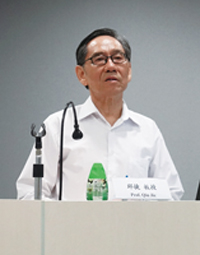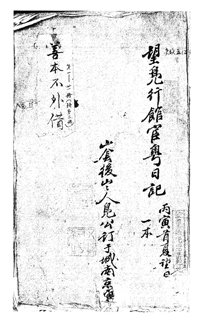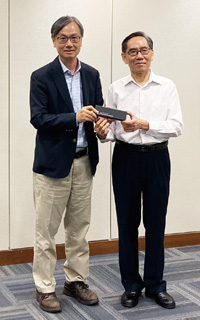Prof. Qiu Jie, former Head of the Department of History at the Sun Yat-Sen University, spoke on the topic “‘The West’ in the Eyes and in the Mind of a Magistrate of Guangdong’s county in the Late Qing” for the Research Programme for Lingnan Culture: Public Lecture Series 2019 on 26 September. The lecture drew about 70 CUHK colleagues and students, alumni and members of the public. Professor Qiu talked about his recent research on the attitudes and responses of the Qing literati toward the West in the nineteenth century. The study focused on the diaries of Du Fengzhi 杜鳳治, a magistrate of Nanhai county of Guangdong in the late Qing, namely the Wang fu xingguan huan Yue riji 望鳧行館宦粵日記, which recorded Du’s first-hand experience in living in and administering the county amid the power struggles between the Canton Governor-general and the foreign diplomats in the region. Professor Qiu reconstructed many exciting episodes of Guangdong-foreign exchanges based on Du’s narratives and revealed the unique perspectives of the late Qing local official in his encounter with the Western civilisation and foreign affairs.
Du Fengzhi had served as magistrate of Guangning, Sihui and Nanhai counties during the Tongzhi 同治 and Guangxu 光緒 reigns. He was known as a member of the traditional Chinese literati and officialdom, while he was also open-minded towards Western knowledge. He read widely and frequently consulted foreign consuls, merchants and local compradors for the latest news. The three-million-word diaries left by such a personality are absolutely valuable primary sources for studying how the late Qing local literati responded to the Western culture. In this aspect, Professor Qiu reminded us that there is no simple answer. For example, Du recoded his purchase of imported products, such as analogue watches and wines, and had his family photographed at different stages of his life, but he never bought foreign-styled clothes or tried Western medical treatment. Du’s diaries, thus, presented multiple facets of a traditional literatus’ reception of western material culture.
Du Fengzhi’s contacts with foreign consuls in official matters are also illuminating. In the diaries, he recorded and expressed opinions on the way foreign consuls handled things, which showed his views on the Western judicial and legal system. Since Guangdong’s foreign affairs at that time were under the responsibility of the Governor of Guangdong and Guangxi, while there was no agency responsible, the magistrate of Nanhai County became an important assistant to the Governor in dealing with foreign affairs. Therefore, Du Fengzhi became the mediator between his superior, the foreigners and the local people. The attitudes and responses of Du Fengzhi toward foreigners are clearly shown in the diaries, and his attitude could be representative of Chinese officials dealing with foreign affairs in the late Qing.
In great detail, Prof. Qiu retold several lawsuits recorded in Du’s diaries that involved expatriates in Guangdong. He pointed out that although it was a common strategy of Du and his colleagues to avoid offending the foreign officials, the actual execution and consequences of such a strategy was very complicated; for example, the US consul intervened in the case involving official land, the British consular intervention in the Hualin Temple case, and disputes arose in the establishment of a joint venture between the foreigners and the Chinese. While the disputes of smuggling vessels across the border reflected that the Chinese officials dealt with foreign affairs from the perspective of traditional Chinese culture, especially from the rules and practices of Chinese officialdom, they also showed a discrepancy between the late Qing and the Western legal systems, which was not fully understood by Du and perhaps other officials of his time.
Synthesizing life episodes and personal reflections in Du’s diaries, Prof. Qiu painted a complex picture of the attitudes of local literati and officials towards the West in the late Qing. His lecture, delivered in an engaging and accessible manner, was an inspiration to researchers as well as to the public. He had a fruitful discussion with the moderator, Prof. Lai Chi Tim, and also took questions from the audience. The lecture ended successfully in a round of applause. |
















